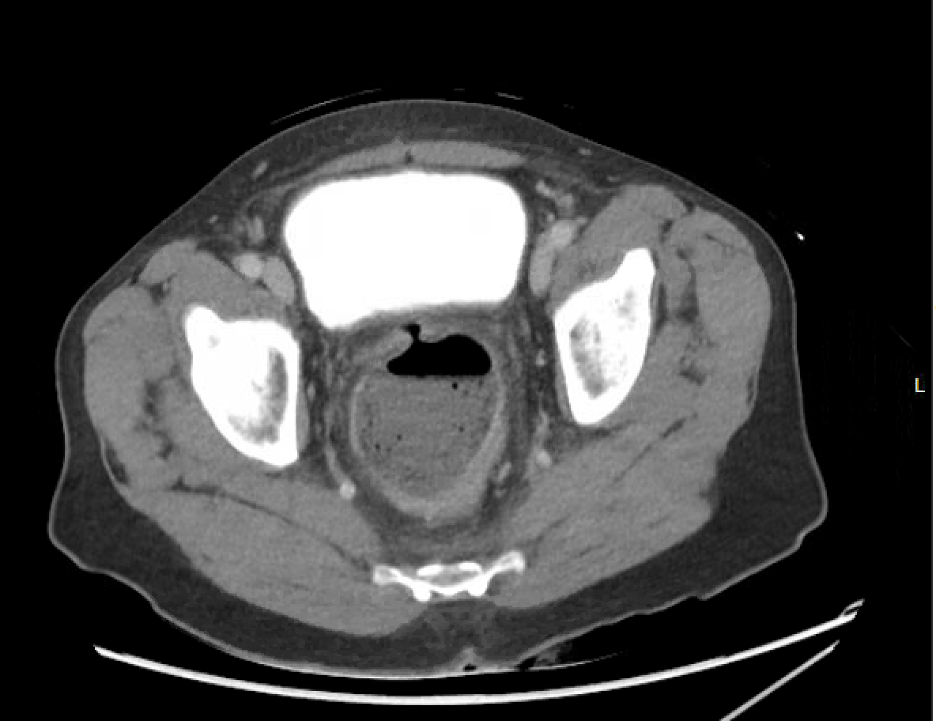Sunday Poster Session
Category: Infections and Microbiome
P1346 - Asymptomatic Diverticulitis Leading to Structural Constipation
Sunday, October 26, 2025
3:30 PM - 7:00 PM PDT
Location: Exhibit Hall

Abdul Khuram, DO (he/him/his)
University of Connecticut Health
Farmington, CT
Presenting Author(s)
Abdul Khuram, DO1, Danzhu Zhao, DO2, Neil Khoury, MD2, Mark Versland, MD2
1University of Connecticut Health, Farmington, CT; 2University of Connecticut Health Center, Farmington, CT
Introduction: Acute diverticulitis is rarely asymptomatic. It often presents with abdominal pain, fever, and leukocytosis. Less commonly, altered bowel habits have been associated with acute diverticulitis. We present a patient who had new-onset constipation due to a diverticular abscess presumably from a recent asymptomatic episode of acute diverticulitis.
Case Description/
Methods: A 68-year-old male presented with one week of constipation. He had mild leukocytosis and an unremarkable physical exam. Patient attempted a tap water enema and magnesium citrate with minimal effect. Computed tomography (CT) abdomen and pelvis revealed an 8.0 x 6.4 x 6.5 cm complex fluid collection in the rectosigmoid region thought to represent an intramural abscess or an inflamed giant diverticulum. A barium enema CT was completed showing similar findings with no evidence of extravasation. Drainage was then performed with placement of a trans-gluteal interventional radiology (IR) drain. Cultures revealed Streptococcus anginosus and Slackia exigua and patient was treated with ceftriaxone and metronidazole. The patient’s symptoms significantly improved, and he was discharged home. One week later, he underwent a drain study which revealed a small residual cavity with a fistula to the colon and rectum. Colonoscopic evaluation revealed multiple diverticula. Robotic diagnostic laparoscopy was then performed with removal of IR drain and placement of a surgical drain. Patient subsequently had complete resolution of symptoms.
Discussion: The presence of constipation is rare in diverticulitis. A retrospective study demonstrated that constipation is reported in around 24.4% of patients with severe CT demonstrated diverticulitis and only 12.5% of those with nondiagnostic or moderate findings. In this case, the patient did not have any evidence of acute diverticulitis on imaging and it may have been sequelae of a prior asymptomatic infection. The development of a diverticular abscess is generally noted in 15-40% of patients who present with acute sigmoid diverticulitis. Abscess formation is known to be intrinsically linked to the inflammatory process of diverticulitis. Among patients with uncomplicated diverticulitis, the risk of progression to developing abscess is approximately 5% within the first three months post infection with most infections occurring in the first 10 days. This case highlights diverticular abscess as an interesting differential diagnosis for a patient presenting with acute onset of constipation without abdominal pain.

Figure: Figure 1: A localized collection in the area of the rectosigmoid region seen on CT abdomen and pelvis.
Disclosures:
Abdul Khuram indicated no relevant financial relationships.
Danzhu Zhao indicated no relevant financial relationships.
Neil Khoury indicated no relevant financial relationships.
Mark Versland indicated no relevant financial relationships.
Abdul Khuram, DO1, Danzhu Zhao, DO2, Neil Khoury, MD2, Mark Versland, MD2. P1346 - Asymptomatic Diverticulitis Leading to Structural Constipation, ACG 2025 Annual Scientific Meeting Abstracts. Phoenix, AZ: American College of Gastroenterology.
1University of Connecticut Health, Farmington, CT; 2University of Connecticut Health Center, Farmington, CT
Introduction: Acute diverticulitis is rarely asymptomatic. It often presents with abdominal pain, fever, and leukocytosis. Less commonly, altered bowel habits have been associated with acute diverticulitis. We present a patient who had new-onset constipation due to a diverticular abscess presumably from a recent asymptomatic episode of acute diverticulitis.
Case Description/
Methods: A 68-year-old male presented with one week of constipation. He had mild leukocytosis and an unremarkable physical exam. Patient attempted a tap water enema and magnesium citrate with minimal effect. Computed tomography (CT) abdomen and pelvis revealed an 8.0 x 6.4 x 6.5 cm complex fluid collection in the rectosigmoid region thought to represent an intramural abscess or an inflamed giant diverticulum. A barium enema CT was completed showing similar findings with no evidence of extravasation. Drainage was then performed with placement of a trans-gluteal interventional radiology (IR) drain. Cultures revealed Streptococcus anginosus and Slackia exigua and patient was treated with ceftriaxone and metronidazole. The patient’s symptoms significantly improved, and he was discharged home. One week later, he underwent a drain study which revealed a small residual cavity with a fistula to the colon and rectum. Colonoscopic evaluation revealed multiple diverticula. Robotic diagnostic laparoscopy was then performed with removal of IR drain and placement of a surgical drain. Patient subsequently had complete resolution of symptoms.
Discussion: The presence of constipation is rare in diverticulitis. A retrospective study demonstrated that constipation is reported in around 24.4% of patients with severe CT demonstrated diverticulitis and only 12.5% of those with nondiagnostic or moderate findings. In this case, the patient did not have any evidence of acute diverticulitis on imaging and it may have been sequelae of a prior asymptomatic infection. The development of a diverticular abscess is generally noted in 15-40% of patients who present with acute sigmoid diverticulitis. Abscess formation is known to be intrinsically linked to the inflammatory process of diverticulitis. Among patients with uncomplicated diverticulitis, the risk of progression to developing abscess is approximately 5% within the first three months post infection with most infections occurring in the first 10 days. This case highlights diverticular abscess as an interesting differential diagnosis for a patient presenting with acute onset of constipation without abdominal pain.

Figure: Figure 1: A localized collection in the area of the rectosigmoid region seen on CT abdomen and pelvis.
Disclosures:
Abdul Khuram indicated no relevant financial relationships.
Danzhu Zhao indicated no relevant financial relationships.
Neil Khoury indicated no relevant financial relationships.
Mark Versland indicated no relevant financial relationships.
Abdul Khuram, DO1, Danzhu Zhao, DO2, Neil Khoury, MD2, Mark Versland, MD2. P1346 - Asymptomatic Diverticulitis Leading to Structural Constipation, ACG 2025 Annual Scientific Meeting Abstracts. Phoenix, AZ: American College of Gastroenterology.
